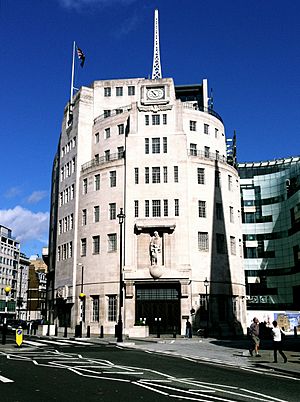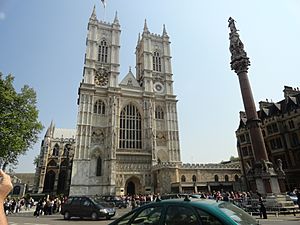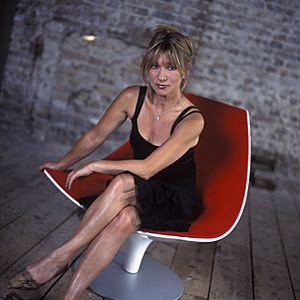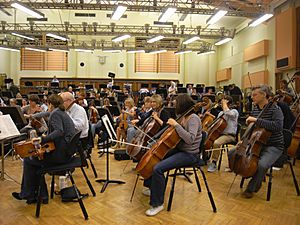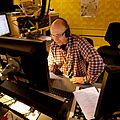BBC Radio 3 facts for kids

Logo used since 2022
|
|
|
|
|---|---|
| Broadcast area | United Kingdom and Internationally via Satellite and BBC Sounds |
| Frequencies |
|
| RDS | BBC R3 |
| Programming | |
| Language(s) | English |
| Format | Classical, jazz, world music, drama, culture, arts |
| Ownership | |
| Owner | BBC |
| History | |
|
First air date
|
30 September 1967 |
|
Former call signs
|
BBC Third Programme |
|
Former frequencies
|
648 MW (1967–1978) 1215 MW (1978–1992) |
| Links | |
| Webcast | BBC Sounds |
BBC Radio 3 is a British national radio station owned and operated by the BBC. It replaced the BBC Third Programme in 1967 and broadcasts classical music and opera, with jazz, world music, drama, culture and the arts also featuring. The station describes itself as "the world's most significant commissioner of new music", and through its New Generation Artists scheme promotes young musicians of all nationalities. The station broadcasts the BBC Proms concerts, live and in full, each summer in addition to performances by the BBC Orchestras and Singers. There are regular productions of both classic plays and newly commissioned drama.
Radio 3 won the Sony Radio Academy UK Station of the Year Gold Award for 2009 and was nominated again in 2011.
According to RAJAR, the station broadcasts to a weekly audience of 1.8 million with a listening share of 1.4% as of December 2022. The current controller of Radio 3 is Alan Davey, since January 2015. In September 2022, the BBC announced that Davey is to stand down as controller of BBC Radio 3 in March 2023.
Contents
History
Radio 3 is the successor station to the Third Programme which began broadcasting on 29 September 1946. The name Radio 3 was adopted on 30 September 1967 when the BBC launched its first pop music station, Radio 1 and rebranded its national radio channels as Radio 1, Radio 2 (formerly the Light Programme), Radio 3, and Radio 4 (formerly the Home Service).
Radio 3 was the overall label applied to the collection of services which had until then gone under the umbrella title of the Third Network, namely:
- the Third Programme proper (as launched in 1946, an evenings-only offering of demanding cultural fare, both musical and spoken)
- the Music Programme (a daytime service of classical music)
- sports coverage (chiefly on Saturday afternoons) and adult educational programming in the early part of weekday evenings (known as Network Three).
All these strands, including the Third Programme, kept their separate identities within Radio 3 until 4 April 1970, when there was a further reorganisation following the introduction of the structural changes which had been outlined the previous year in the BBC document Broadcasting in the Seventies.
Operation
BBC Radio 3 broadcasts from studios inside the 1930s wing of Broadcasting House in central London. However, in addition to these studios, certain programmes and performances are broadcast from other BBC bases including from BBC Cymru Wales' Cardiff headquarters and BBC North's headquarters at MediaCityUK, Salford. The BBC also has recording facilities at the Royal Albert Hall, the Royal Festival Hall and the Queen Elizabeth Hall which can be used to record and broadcast performances at these venues.
BBC Radio 3 is broadcast on the FM band between 90.2 and 92.6 MHz, on DAB Digital Radio, the digital television services Freeview, Freesat, Sky, Virgin Media, TalkTalk TV and Virgin Media Ireland and on BBC Sounds both online and on the app, where Radio 3 programmes can be listened back to.
On its FM frequencies, the station uses less dynamic range compression of the volume of music than rival station Classic FM. On DAB it uses dynamic range control (DRC) which allows compression to be defined by the user.
The station also uses a BBC-designed pulse-code modulation digitisation technique similar to NICAM, which is used for outside broadcasts running through a telephone line. This runs at a sample rate of 14,000 per second per channel. A similar technique was later used for recording at the same rate. In September 2010, for the final week of the Proms broadcasts, the BBC trialled XHQ (Extra High Quality), a live Internet stream transmitted at a rate of 320kbit/s, instead of Radio 3's usual 192kbit/s, using its AAC-LC 'Coyopa' coding technology. This technology was later developed further, and Radio 3 became the first BBC Radio station to broadcast permanently in this High Definition Sound (as it has been termed) format.
Notable programmes
Choral Evensong
The Anglican service of sung evening prayer is broadcast on Wednesday afternoons. It is broadcast live from cathedrals, university college chapels and churches throughout the UK. On occasion, it broadcasts Choral Vespers from Catholic cathedrals, (such as Westminster Cathedral), Orthodox Vespers, or a recorded service from choral foundations abroad. Choral Evensong is the BBC's longest-running outside broadcast programme, the first edition having been relayed from Westminster Abbey on 7 October 1926. Its 80th anniversary was celebrated, also live from Westminster Abbey, with a service on 11 October 2006.
When Choral Evensong was moved from Radio 4 to Radio 3 with effect from 8 April 1970 and reduced to just one broadcast per month, the BBC received 2,500 letters of complaint, and weekly transmissions were resumed on 1 July.
In 2007 the live broadcast was switched to Sundays, which again caused protests. The live transmission was returned to Wednesdays in September 2008, with a recorded repeat on Sunday afternoons at approximately the same time. Choral Evensong forms part of Radio 3's remit on religious programming though non-religious listeners have campaigned for its retention.
Composer of the Week
Composer of the Week was launched in the BBC Home Service on 2 August 1943 under its original title of This Week's Composer. From 15 December 1964 the programme became a regular feature in the schedule of the newly established daytime "Third Network" classical music service, the Music Programme (later to be absorbed into Radio 3). The programme was renamed Composer of the Week on 18 January 1988.
Each week, in five daily programmes, which air at midday, the work of a particular composer is studied in detail and illustrated with musical excerpts. Bach, Beethoven, Haydn, Mozart and Handel have all featured once most years, a different aspect of their work being chosen for study each time. However, the programme also covers more 'difficult' or less-widely known composers, with weeks devoted to Rubbra, Medtner, Havergal Brian, Kapralova, and the Minimalists among others. The programme is written and presented by Donald Macleod. On 2 August 2013, in honour of the station's 70th year, listeners were asked to nominate a composer who had never before been featured for a special broadcast at Christmas. The composer listeners chose was Louise Farrenc.
Lunchtime / Afternoon Concerts
These two programmes showcase live or recorded performances from venues across the country. Lunchtime Concert broadcasts from 1 to 2 pm, with the Afternoon Concert following from 2 pm until 5 pm, with presenters being rotated weekly for the latter programme. The live Monday edition of the Lunchtime Concert is repeated on Sunday at the same time.
The Early Music Show
The Early Music Show presents European music dating up to the time of Bach, broadcast at 2 pm each Sunday. Episodes cover the music, the performers, and occasional discussions of musical style. Regular presenters include Lucie Skeaping and Hannah French.
In Tune
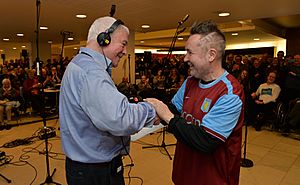
In Tune is "Radio 3's flagship early evening music programme". It was first broadcast on 13 July 1992 and was launched in response to the forthcoming launch of the competitor radio station Classic FM. Since 1997 the programme has been presented by Sean Rafferty and (since 2017) Katie Derham, and features a mix of live and recorded classical and jazz music, interviews with musicians, and arts news. The show is noted for its relaxed, convivial style of presentation.
Jazz Record Requests
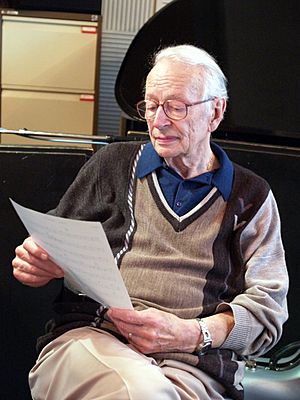
Jazz Record Requests was the first weekly jazz programme on the Third Programme. First presented by the jazz musician Humphrey Lyttelton, the 30-minute programme was launched on 12 December 1964 and is still running. Now an hour long, it was broadcast on Saturdays, usually in the late afternoon, until October 2019 when it moved to Sunday afternoon. Presenters on Radio 3 have included Ken Sykora, Steve Race, Peter Clayton, Charles Fox and Geoffrey Smith. Alyn Shipton became the presenter in May 2012.
Pied Piper
Pied Piper was a children's programme, presented by early music specialist, David Munrow, with the sub-title Tales and Music for Younger Listeners and ran from August 1971 until 1976. Lively and varied, it was aimed at the 6–12 age group, though much older children and adults also listened. The programme ran for five series and a total of 655 episodes until Munrow's death in May 1976.
Opera on 3
Broadcast on Saturday nights between 6:30 and 10 pm, featuring live performances by the Metropolitan Opera from the Metropolitan Opera House in New York City.
The Proms
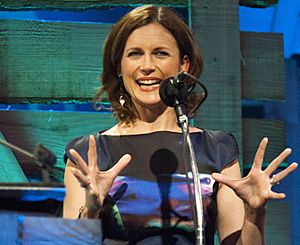
The annual BBC Proms concerts are broadcast live each summer on Radio 3. Broadcasting the Proms began in 1927, when the Third Programme transmitted the Thirty-Second Season of the Promenade Concerts live from the Queen's Hall, conducted by Sir Henry Wood. The BBC's involvement with the Proms led to the creation of the BBC Symphony Orchestra and the BBC Wireless Orchestra to perform music. Television transmission began in 1947 and today, selected concerts are also simulcast on BBC Four. Promenade concerts are centred on the Royal Albert Hall with broadcasts from other venues around the UK.
Radio 3 in Concert
Radio 3 in Concert (originally Live in Concert) is a weeknight programme, broadcast between 7:30 and 10 pm, with recorded concerts from various venues around the country and Europe. Regular presenters include Nicola Heywood-Thomas, Martin Handley and Petroc Trelawny. The last broadcast with the Live in Concert name was on 15 July 2015.
Record Review
Record Review is a Saturday morning programme (usually airing from 9 am to 11:45 am) dealing with recent classical music releases, topical issues and interviews. The programme title is a return of Record Review which was broadcast on Network Three occasionally from 1949, then weekly from 1957. As of October 2020[update] the regular presenter of Record Review is Andrew McGregor.
From 1998 to 2015 it became CD Review, until on 2 January 2016, its title reverted to Record Review to reflect the diversity of media proliferating (CDs, downloads, streaming, and so forth).
It includes the feature Building a Library which surveys and recommends available recordings of specific works.
Through the Night
The show broadcasts for six hours, beginning weekdays at 0:30 and weekends at 1:00. It currently has three regular presenters: Catriona Young, John Shea and Jonathan Swain. The show is a national version of the BBC's Euroclassic Notturno.
The Verb
This show, presented by poet Ian McMillan, is described as a "cabaret of the word, featuring the best poetry, new writing and performance". It broadcasts for 44 minutes at 10pm on Friday nights.
News broadcasts
BBC Radio 3's remit focuses mainly on music and the arts, and news is a minor part of its output, though the station does provide concise news bulletins every half hour from 06:30 to 08:00 throughout the Breakfast programme and also at 13:00, 17:00 and 18:00 to give listeners the chance to switch to a more news-oriented station should they want more details about a particular news item. Following the Delivering Quality First proposals, it was suggested that Radio 3 share bulletins with Radio 4, so that the same bulletins would be broadcast on both channels. During weekdays the 1 pm, 5 pm and 6 pm news bulletins are read by a member of the Radio 4 presentation team.
From 30 March until 12 July 2020 due to the COVID-19 pandemic, the Radio 3 bespoke bulletins were replaced by network news bulletins from BBC Radio 2. These were broadcast at 08:00, 13:00 and 18:00 on weekdays, and at 08:00 and 13:00 on weekends. This format came back into effect from 24 December 2020 until 4 April 2021.
Performing groups
Much of Radio 3's orchestral output is sourced from the BBC's Orchestras and Singers. These groups are:
- The BBC Symphony Orchestra and BBC Symphony Chorus, based in London
- The BBC Concert Orchestra, based in Watford
- The BBC Philharmonic, based in Salford
- The BBC National Orchestra of Wales and the BBC National Chorus of Wales, based in Cardiff
- The BBC Scottish Symphony Orchestra, based in Glasgow
- The BBC Singers, based in London.
In addition to the BBC's own orchestras it also has broadcast commitments to the BBC Big Band, which is externally managed, and also broadcasts some works of the Ulster Orchestra, which it part funds.
Images for kids
-
Radio 3 broadcasts the BBC Proms live every year from the Royal Albert Hall and other venues
See also
 In Spanish: BBC Radio 3 para niños
In Spanish: BBC Radio 3 para niños


